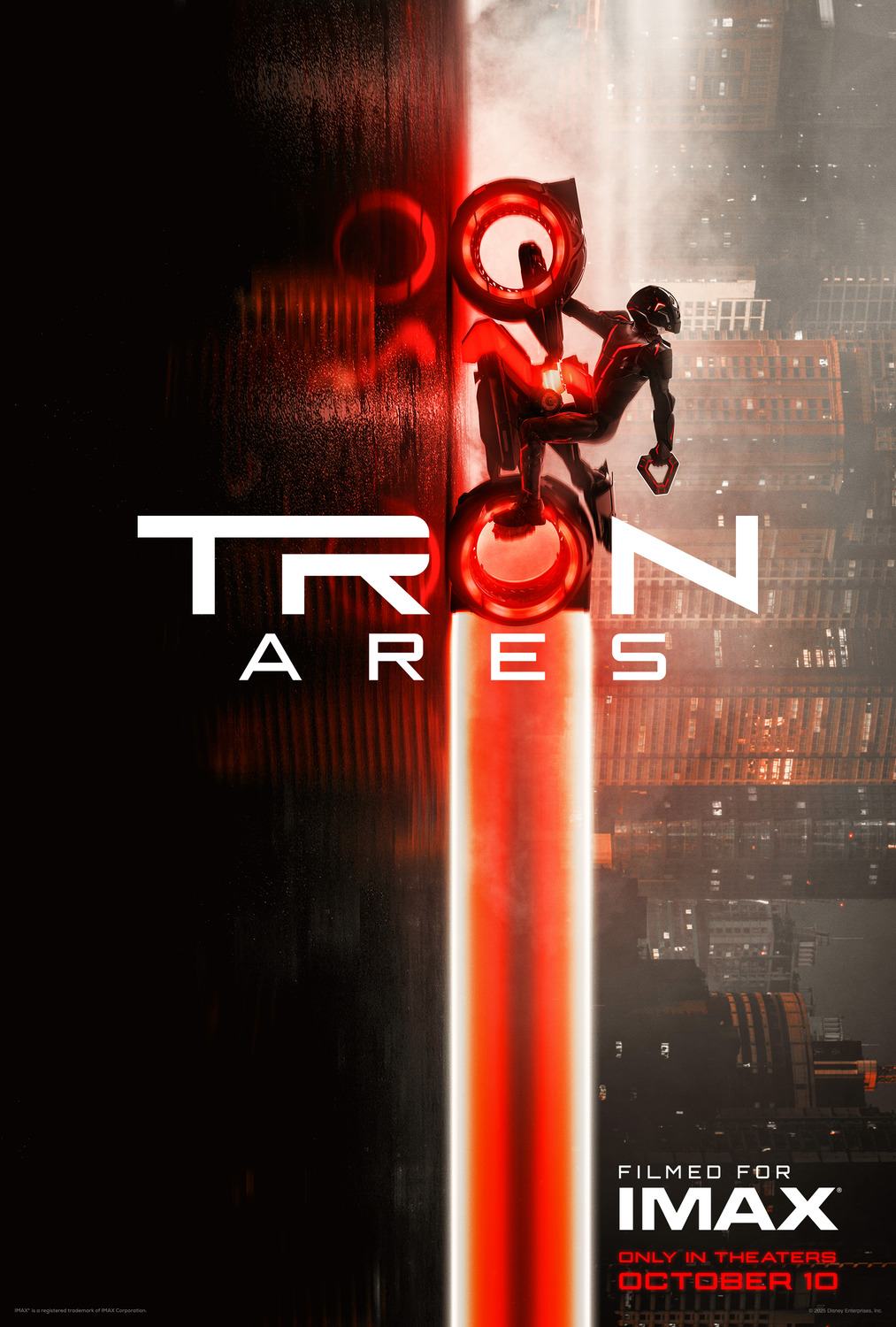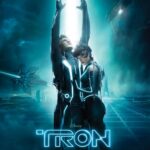Director
Joachim Rønning
Starring
Jared Leto
Greta Lee
Evan Peters
Set 15 years after the events of Tron: Legacy, the tech giants ENCOM and Dillinger Systems are still battling for supremacy. One headed by Ed Dillinger’s grandson Julian [Peters], the other by sisters Tess and Eve Kim [Lee] – the former of whom died trying to perfect the ‘permanence code’ that would allow projections and programs to survive in our world. With both CEOs racing to make this world-shattering breakthrough, Julian sends in his new Master Control Program: Ares [Leto], to hack ENCOM’s systems and cause general chaos. The only problem? Ares has feelings and is rebelling against his programming.
Tron: Ares is the definition of vacuous. It is a thoroughly boring and mind-numbingly dry experience from start to end. Granted, both Tron and Tron: Legacy suffer from visuals carrying the most paper-thin of premises, but they had enough charm to leave a cultural footprint and establish a fanbase. Ares can’t muster the tenacity or boldness to grip you in the same way. And in an age when tech CEOs are monsters and AI is their false saviour, this film had the platform to make something of substance and impact. Instead they chose the most rote path with a blunt binary dichotomy between “I’m making soldiers and tanks” bad billionaire CEO and “I’m making food to feed the world” good billionaire CEO. Replete with shockingly poor exposition fed to us clumsily with data feeds, hacks, and snippets from news reports. And an attempt at corporate espionage that just wildly swings into domestic terrorism. And the truly damning thing is this movie thinks it’s making a bold statement – which is painfully embarrassing.
But at least it looks pretty, right? Well, no. The one crutch that both Tron films fell back on is deceptively deployed here. Essentially, you’re duped into thinking Tron: Ares is as visually and aesthetically rich as the other two releases, but then it slowly becomes apparent that this is in fact an uglier outing. Not only by restricting itself through excessive use of the real world, but also for action shots that are erratic and jarring, as well as a litany of uninventive directorial choices. Yeah, there’s some solid CGI that amazes sporadically but with this kind of budget, that’s not an impressive achievement – that’s merely your starting point.
What about the sound? I hear you ask. The undeniable highlight of this movie’s predecessor is the world class Daft Punk soundtrack. Well, watching in IMAX, it was certainly a thunderous experience, with cinema rattling sound design and a powerful electronic score from Reznor and Ross that delighted me. But it has such a different, more pulsating, frenzied vibe, that it makes its own mark and positions itself far away from the Daft Punk score, to the extent it will both impress and frustrate. In isolation, the music is haunting, kinetic, and striking, but its inclusion simply can’t make up for the surprisingly sub-par action sequences.
In truth, this movie was doomed to fail because the script is horrendous. The overarching plot, the MacGuffin chase, casually dipping in-and-out of respective corporate servers, the dialogue, character interactions, it’s all disturbingly first draft. Which isn’t helped by the fact that universe changing developments are thrown at the audience without build-up or consequence. The arbitrary 29 minute conceit (i.e. the amount of time these programs can survive in our world before de-rezzing) is stretched remarkably thin, and far too much is crammed into that half hour; especially as the printing facility feels half an hour away from the city. Then we have the classic “I don’t know how planes work” action schlock that veers into Transformers levels of stupidity. Don’t get me wrong, I enjoy some casual cinematic destruction but to just deploy military jets and fire missiles into a densely populated area? Even 98’s Godzilla didn’t resort to that until the city was evacuated. And then we have the obligatory shoehorning of Jeff Bridges. The entirety of Tron: Legacy’s story was trying to figure out how that character could exist in that setting, but here we have the most dismissive single line of dialogue in “I exist in this world in the same way you do” which makes zero sense and comes off as insultingly slapdash.
Speaking of acting, let’s talk about Jared Leto. On paper, the concept of an eternal soldier whose sole existence has been to live and die on repeat, gives us a great foundation for a troubled mind. A digital puppet wanting to escape the hell of that cycle and become a real boy. And while Jared Leto is undeniably awful, it should be noted that I don’t think there would have been another casting choice that could have elevated the character. Not without strong rewrites and personality injection that would fundamentally subvert the wider narrative. Even Greta Lee struggles to make this stuff tolerable, so I can’t imagine a substituted lead would fare better. Similarly, Evan Peters brings an excess of eccentricity to his performance but still plays the role as expected. Albeit slightly outside the realms of credulity – namely that he acts like a coked up 80s yuppie, minus the coke, so his irrational confidence and cavalier attitude feel unjustified. This movie is not populated by relatable or believable people, they’re avatars with the exclusive purpose of pushing the film from bland beat to bland beat.
With every Tron feature, the assignment is remarkably simple: be cool. An engaging story, compelling and memorable characters, straightforward morals – these are all arguably secondary. Because if it can’t convince us that what we’re seeing and hearing is the coolest thing ever put to screen, it’s already failed. What’s more, Tron: Ares suffers from the Jurassic Park sequel problem, with a desperation to see the grid play out in our world. Only to realise it doesn’t have the same effect or impact, and audiences aren’t especially hungry for that. What was needed was a clever, articulate reflection of where our world is currently heading, an analysis of how gaming and tech has changed our views and priorities, a deep philosophical discussion about the nature of reality and servitude to systems and overlords, and a series of unmatched visual action sequences that push the boundaries of what we’ve seen to date. And yet Tron: Ares can’t even scratch the surface of one of those concepts.
Release Date:
10 October 2025
The Scene To Look Out For:
En route to the final showdown, Ares hot-wires a Honda Civic and then waxes lyrical about the importance of Depeche Mode. It’s such a handbrake turn from his stoic warrior schtick and feels like an obligatory injection of an almost anti manic pixie dream girl tone. With the added bonus of rapid fire clumsy pseudo-psychology that barely passes for character bonding and levity.
Notable Characters:
Say what you will about where Tron: Legacy left things, it still gave the studio an interesting jumping off point: with Quorra the living ISO finding her place in our world. But to mercilessly jettison that connective thread – along with Garrett Hedlund, Olivia Wilde, and Cillian Murphy – and supplant it with this is bizarre. Not for the action of cutting it, but for the graceless referencing to Hedlund and Wilde’s characters, and the complete dismissal of Murphy, substituted with Gillian Anderson in the agonisingly neutered role of Julian’s mother.
Highlighted Quote:
“Don’t be afraid, I gave a thousand lives for the grid. You only have to give one.”
In A Few Words:
“A corporate shambles of a blockbuster that doesn’t deserve your attention.”
Total Score: 1/5

![The Red Right Hand Movie Reviews [Matthew Stogdon]](https://reviews.theredrighthand.co.uk/wp-content/uploads/2021/12/cropped-header1.png)



